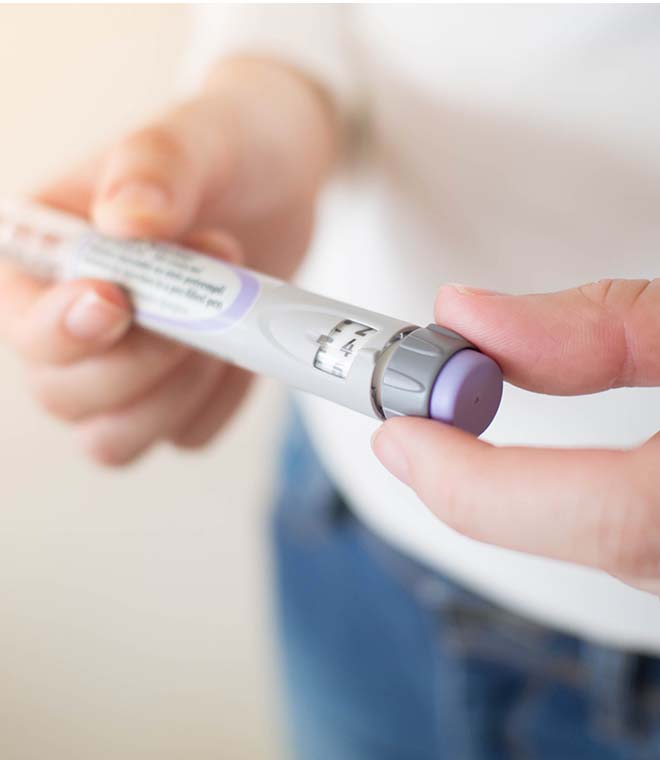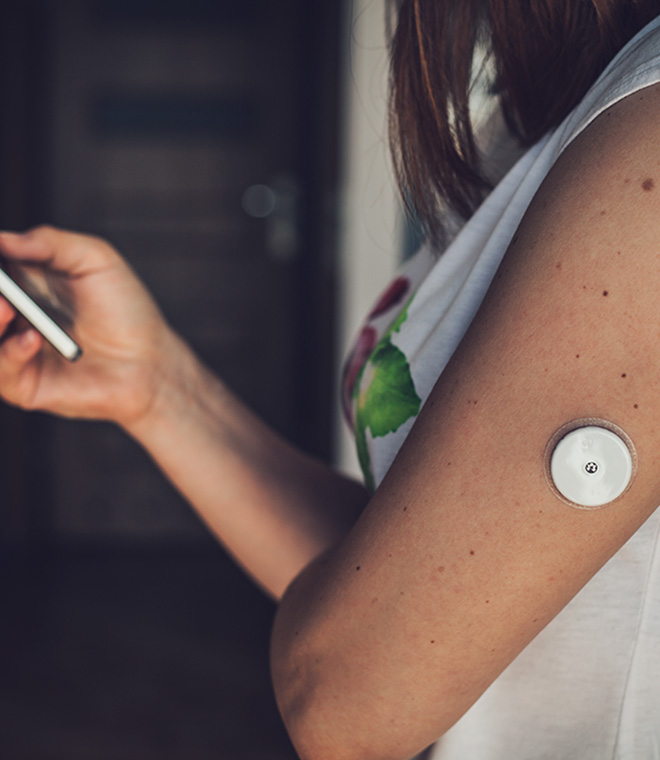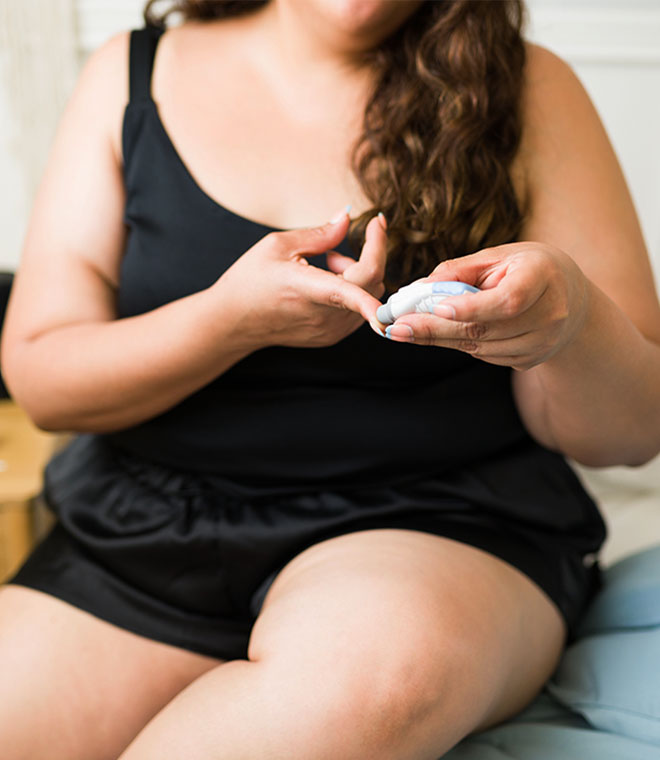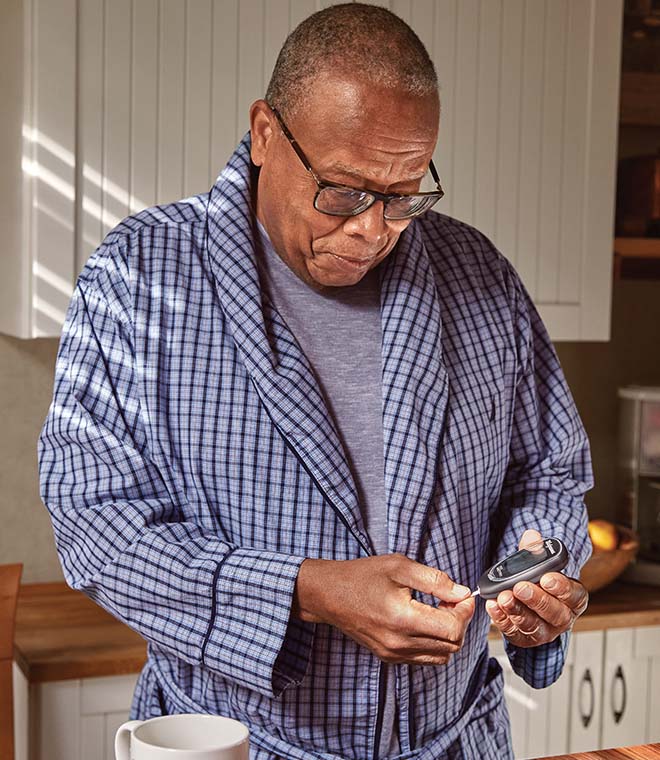Health
CGM 101: What you need to know about continuous glucose monitoring
By Walgreens Sep 22, 2022 • 19 min
If you have diabetes or care for someone who does, you know the key to staying healthy over the long term is keeping your blood sugar level within your target range. To do that, you need to check your blood sugar levels regularly. You’re probably familiar with the traditional blood glucose monitor, which checks a small amount of blood from your finger or arm. Now there’s a different option for glucose monitoring: continuous glucose monitoring systems, also known as CGMs.
Learn about how CGMs work: the benefits, general costs and how to get one.
What is a CGM?
A continuous glucose monitor is a device that helps you track your glucose levels throughout the day with fewer fingerstick tests. Unlike a traditional glucose meter, which only gives you a blood sugar reading when you do a fingerstick test, a CGM is a wearable glucose monitor that measures your glucose levels every few minutes.
You can connect a CGM to your smartphone, a wearable device like a fitness tracker or smart watch, or an insulin pump. That means a CGM can give you more than just a current reading. By showing you where your glucose has been and where it is going, it provides a more complete picture. You can also download CGM data to a computer, which makes it easy to view trends over time. This information can be shared with your healthcare provider and caregiver to help manage your diabetes effectively.
CGMs are safe and effective for monitoring glucose levels in people with type 1 and type 2 diabetes. Using a CGM can help you improve the quality of glucose control and reduce the risk of low glucose episodes (hypoglycemia), in addition to helping you lower your glucose levels over time. CGMs feature customizable alarms that you can use to alert you when your glucose level is too low or too high.
How does a CGM system work?
You can choose from several brands of CGM devices with different features, all of which generally work in the same way:
- You insert a tiny sensor filament under the skin of your abdomen or the back of your upper arm.
- The CGM sensor automatically measures the glucose levels in the fluid between your cells (called interstitial fluid) every one to five minutes.
- Wireless transmitters send glucose information to a monitor, smartphone or wearable device for you to view.
You should replace your CGM sensor every 10 to 14 days, depending on the brand you use, and you may need to test your glucose levels using a traditional fingerstick to make treatment decisions when the CGM’s results do not align with your symptoms or expectations.
What are the benefits of using a CGM?
Real-time feedback on how your glucose changes throughout the day can help you better manage your diabetes over the long term:
- 24/7 monitoring. Steady monitoring builds data, giving you hundreds of readings every day, so you can see the effect of food, beverages, exercise and other activities on your glucose levels in real time.
- Trend tracking and alerts. Features that track your glucose trends over several hours can help you take action to keep your blood sugar within your target range and alert you if your glucose levels become dangerously high or low.
- Fewer fingerstick tests. You won’t need to measure your blood sugar with fingerstick tests as often, giving CGM a real edge in convenience compared to traditional blood glucose monitoring systems.
Does it hurt to insert the CGM sensor?
Most users say that inserting a CGM sensor isn’t painful. The feeling is often described as a slight pinching sensation as the sensor slides under the skin, after which the sensor is comfortable and easy to wear. Using a CGM also means you won’t have to prick your finger as often as with a traditional blood glucose monitor.
Are CGMs accurate?
Although any technology has a margin of error, CGM accuracy continues to improve, and almost all users report terrific accuracy. If your glucose alerts or readings from a sensor do not match your symptoms or expectations, use a fingerstick blood glucose reading from your blood glucose meter to make diabetes treatment decisions.
How much does a CGM cost?
If you’re paying out of pocket, the retail price of a CGM can be hundreds of dollars. You’ll want to consider the ongoing cost of CGM supplies in your financial calculations as well, such as replacement sensors. Estimated monthly costs for CGM devices and supplies can average $100 to $500 per month or more.
Does health insurance and Medicare cover the cost of a CGM?
CGMs may be covered by some health insurance plans or Medicare, which can significantly reduce your out-of-pocket costs. However, many insurance plans require prior authorization before they’ll cover a CGM. Ask your healthcare provider about how to get one for your specific situation.
Insurance plans have different approval processes. Contact your provider to see if a CGM is covered under your plan, whether you need prior authorization, and what additional steps are needed. You can appeal the decision if your insurance company denies coverage for a CGM.
Here are some general guidelines regarding coverage for Dexcom G6 and FreeStyle Libre 2:
Dexcom
- 99% of private insurance, Medicare and Medicaid in more than 40 states cover Dexcom CGM devices
- Over 85% of Dexcom patients with pharmacy coverage in the U.S. pay less than $60 per month for CGM
- One-third of Dexcom patients with pharmacy coverage in the U.S. pay $0 out of pocket
Freestyle Libre 2
- Most commercially insured patients pay between $0 and $60 per month for FreeStyle Libre 2 sensors* and no more than $65 for a FreeStyle Libre 2 reader†
- The Freestyle Libre 2 system is covered by Medicare for those who qualify with a prescription‡
- If you have Medicare and are interested in getting started, please call the Abbott FreeStyle Libre consumer relations team for assistance toll-free at 1-833-825-4273
What resources are available at Walgreens to help me cover the cost of a CGM?
Walgreens Prescription Savings Club helps you save on the cash prices of your Dexcom and Abbott CGM devices and accessories at participating Walgreens and Duane Reade pharmacies:
- Save up to 20% on diabetic testing devices and accessories§
- Save 10% or more on Abbott and Dexcom CGM devices and accessories§
- Save 10% or more on your diabetic testing devices, with up to 20% savings on Freestyle Libre 14 Sensor§
Start saving today. Search for your CGM and see how much you could be saving with a PSC membership.
How can I get a CGM?
CGMs are available at Walgreens with a prescription. Your local pharmacist can help by requesting one from your provider. You can also have your doctor write a prescription to be filled through a durable medical equipment supplier or another participating retail pharmacy.
Walgreens currently offers two CGM options: Dexcom G6 and FreeStyle Libre 2. Follow these easy steps to get started:
- Visit Walgreens Find Care® online or use our app.
- Choose FreeStyle or Dexcom under Diabetes Monitoring & Injection Supplies and click “Request Rx.”
- Sign in to your Walgreens account and fill out the request form.
- Click “Submit request,” and you’re done! We’ll contact you when your prescription is ready for pickup.
Are CGMs available for all ages?
CGMs are approved for adults and children age 2 and older with a doctor’s prescription.
When should I speak to a provider?
If you’re interested in learning more about how a CGM system can make it easier for you to manage your diabetes, talk with your healthcare provider or ask your local Walgreens pharmacist. Pharmacy Chat makes it easy to connect with Walgreens pharmacy experts 24/7.
Your healthcare provider can help you decide whether a CGM is right for you and can write you a prescription. Your healthcare provider can also assist you in getting a CGM covered under your insurance. Connect with a healthcare provider using Walgreens Find Care®.**
CGMs can improve your diabetes care
CGMs represent a big leap forward in glucose monitoring, empowering people to see, track and respond to changes in glucose levels in real time. Ultimately, this leads to better diabetes management and healthier behaviors to help avoid dangerous complications, such as blindness and kidney damage.
See which CGMs we offer at Walgreens.com/CGM or ask your local Walgreens pharmacist.
*Data on file. Abbott Diabetes Care. Abbott provides this information as a courtesy; it is subject to change and interpretation. The customer is ultimately responsible for determining the appropriate codes, coverage and payment policies for individual patients. Abbott does not guarantee third-party coverage or payment for our products or reimburse customers for claims that are denied by third-party payors. Based on prescription claims for commercially insured patients using the FreeStyle Libre 2 system. Does not include Medicare, Medicaid or uninsured patients. The actual amount a patient pays may vary. The FreeStyle Libre 2 system requires a prescription.
†Data on file. Abbott Diabetes Care. Abbott provides this information as a courtesy; it is subject to change and interpretation. The customer is ultimately responsible for determining the appropriate codes, coverage and payment policies for individual patients. Abbott does not guarantee third-party coverage or payment for our products or reimburse customers for claims that are denied by third party-payors. Benefits for FreeStyle Libre 2 sensors apply to two FreeStyle Libre 2 sensors per month. Benefits for FreeStyle Libre 2 reader apply to one FreeStyle Libre 2 reader. Void where prohibited by law. Abbott may modify, rescind or revoke these benefits at any time without notice. Offer available to commercially insured patients only. These benefits are not available to beneficiaries of Medicare, Medicaid or other federal or state healthcare programs. For Massachusetts residents, only those patients responsible for the full cost of the product may be eligible to receive these benefits. These benefits are only available at participating pharmacies, which are subject to change without notice. The actual amount a patient pays may vary. The FreeStyle Libre 2 system requires a prescription.
‡Abbott provides this information as a courtesy; it is subject to change and interpretation. The customer is ultimately responsible for determining the appropriate codes, coverage, and payment policies for individual patients. Abbott does not guarantee third-party coverage or payment for our products or reimburse customers for claims that are denied by third-party payors. Medicare coverage is available for the FreeStyle Libre 2 system if a compatible smartphone is used in conjunction with the FreeStyle Libre 2 reader to review glucose data. Medicare and other third-party payor criteria apply. Patients must meet the Medicare eligibility coverage criteria. Local Coverage Determination: Glucose Monitors (L33822), 2022. FreeStyle Libre 2 system will be list priced the same rate as FreeStyle Libre 14-day system. The actual cost to patients may or may not be lower than other CGM systems, depending on the amount covered by insurance, if any.
§Savings is calculated by comparing the estimated Walgreens cash retail price with the member price of a 30-day fill for each prescription being compared. Prices are subject to change and vary by store. Actual costs and savings may vary from what is shown. The membership price cannot be combined with insurance or a federal or state program. Terms and conditions apply.
**Each third-party organization displayed on Walgreens Find Care® is an independent company that has contracted with Walgreens to be listed on these webpages and to display information to consumers about its services. This display should not be viewed as a recommendation, endorsement or guarantee by Walgreens of the organization or its services. The services are provided by the respective organizations, not Walgreens, in accordance with the organization’s terms and conditions and privacy policies. None of the organizations displayed, or their respective healthcare providers or staff, are affiliated with or employees or agents of Walgreens or any Walgreens subsidiary or affiliate. Walgreens is not responsible for, and disclaims all liability, for the services provided by the listed organizations on Walgreens Find Care®.
Published September 2022.
Sources:
- American Diabetes Association. https://diabetes.org/healthy-living/devices-technology
- https://jamanetwork.com/journals/jama/fullarticle/2598770
- https://www.healthline.com/diabetesmine/when-you-cant-afford-a-cgm#Dexcom-G6
- https://www.niddk.nih.gov/health-information/diabetes/overview/managing-diabetes/continuous-glucose-monitoring
- https://www.ncbi.nlm.nih.gov/pmc/articles/PMC5467105/
- https://www.cdc.gov/diabetes/managing/managing-blood-sugar/bloodglucosemonitoring.html




